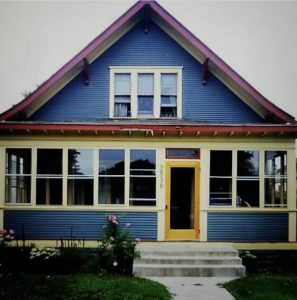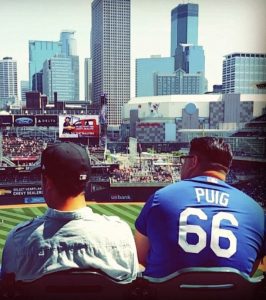
The sound and harmony that pulsates heavily in my heart and reminds me of my three years of life in Minneapolis is “Luna Lovers” by Las Cafeteras. My beautiful friends Reina and Danny, who became my chosen family while my spirit trudged slowly over the salty ice of the Twin Cities, would play this melody every night to bring peace and sweet dreams to their beautiful infant Diego Tlatoani. On nights when my dear friend Soham and I would visit Reina’s and Danny’s cozy and warm apartment to hang out with our newest nephew, “Luna Lovers” was always on repeat and would soak the airwaves of our whispering platicas.
The echoes of the melody and lyrics still warm my soul whenever I am as sad and depressed as I was in Minneapolis. “Won’t you walk with me luna through the dark/ won’t you take my hand help me understand/take my hand/walk me through your land.” The song’s opening lines capture Diego, Danny, Reina and Soham’s familial comfort of friends from Los Angeles caring for each other in the unfamiliar and violent terrain of the Midwest—“So the story goes that my heart met yours, you touched my soul/it’s you I adore/it’s your beauty where I feel most free/it’s you and me and it’s plain to see.” It is no coincidence then that through their friendship I found my life partner, Letty, once I moved back to Los Angeles and it is therefore no coincidence that my story about my life in Minneapolis is more than just sorrow, it is a story of friendships.
The lines “won’t you walk with me luna through the dark” remind me of my friends and I being kicked out of Target Field by police for simply having cheered for then Los Angeles Dodger Right Fielder Yasiel Puig in Spanish. Excited to wear our Dodger jerseys and cheer for our favorite player, we were ecstatic to yell “vamos Puig” and “lo queremos mucho Puig.” A white woman in front of us turned around and told us that in “we don’t speak that here,” and kept telling us “to shut the fuck up.” Her partner ran to security and without ever hearing our story, and then we were “escorted” out of the park. A violent reminder that there was no place for brown folks being proud in the corporate terrain of white Minneapolis feminism. If it wasn’t for my friends sharing a drink with me after, ordering chicken wings and consoling each other, I would not have been able to appreciate the luna through the dark that night.

The lines “won’t you take my hand help me understand” remind me of my first, and sadly one of the few, queer nightclub experiences in downtown Minneapolis. If it wasn’t for my roommate Soham’s solace and kindness after a white cisgender queer man bumped into me and let me know that he wouldn’t dare be caught with someone who wears Nike Cortez sneakers to a gay bar, my homesickness for a brown space of queerness and community would have driven me way further down the numbing of a bottle. It was Soham’s racialized solidarity that supported me when at school another graduate student of color had the audacity to grab the collar of my shirt to check the tag of my sweater that they seemed to gush over and state quite sternly and directly to my soul that “oh, must be from WalMart…gross.” If it wasn’t for my friends “taking me by the hand to help me understand” by going to dinner with me, sharing a meal and processing the racialized classism, I would not have been able to dig myself out of the hole of numerous people telling me to stop wearing hoodies (in the middle of polar vortex weather) and substitute them with more presentable attire for a department event to make “good impressions” and appeal to whiteness. If it wasn’t for my friends, I would not have processed with support and love the violence in the tongue of another white graduate student exclaiming that “Mondays were Maid Mondays back where he went to school” because that’s when the brown women came in to clean up after frat parties. Who else but my friends could have grounded me in the worth of my mother’s housekeeping labor?
The lines “and I’m asking you to stand/stand by my side (by my side)/and come along with me down the river singing the song” grounded me in the countless conversations Terrel, a wonderful friend I met in my time in Minnesota, would have about music, community, activism and love adjacent to, across, and at the banks of the frozen and/or flowing Mississippi River. His reassurance of the value and power of comparative racialized politics in our conversations at the bowling alleys at Memory Lanes, in the studio for Radio Pocho, or through spicy wings at Smalley’s in Stillwater always transformed the tensions I was feeling in the teaching and activism I was doing on campus. In activist spaces, self-proclaimed white “radicals” would begrudge the “unwillingness” of activists of color to prioritize solely a class analysis of the violence that saturated the Twin Cities and thereby aimed to stifle our queer- and feminist-of-color ruptures. It was Terrel’s kind listening and loving laugh that transcended any of that nonsense.Our “unwillingness” of course was a refusal to center whiteness in our organizing, teaching and everyday life, especially Marxism’s prototype of revolution—which in Minnesota, often gets misplaced in the ideal of the white Midwestern farmer, while ignoring the energies and labors of the Black communities who fled Jim Crow, the recent immigrant farmworkers from Mexico and Central America, or the Black Muslim Somali community, much less the Ojibwe people whose land this myth claims a stake over. In work with the Whose Diversity? activist collective at the University of Minnesota, I would leave meetings with then-University President Kaler when he would repeatedly say “be patient, change is slow, be patient, change is slow” when we would demand the university end its contract with Minneapolis Police Department after repeated targeting, surveillance and violence against communities of color. As history would show repeatedly with the countless murders of Black people, ongoing genocide of Indigenous communities and sacred land, the never-ending war on terror and anti-Muslim racism, the anti-immigrant violence against Latinx communities, and the perpetual murder of queer and trans* people of color, a one-dimensional class analysis and a white liberal progressive temporality of “slow change” are part of the fissure and fusion of white supremacy’s wrath on us. And yet, I say this with no hesitation, my friends saved my spirit from the eternal and seemingly never-ending return of violence with nights of ceviche at Soham and my apartment, taking the I-35W interstate highway to protest the killing of unarmed Black people, or in continuing our studies with cups of coffee at the countless coffeeshops we loved—especially Studio 2.
When I moved to Minneapolis in the summer of 2013, I choose to live in Whittier because I grew up in Whittier, California. A symbolic gesture to find home away from home. Yet, these two spaces, which ironically are named after anti-slavery abolitionist poet John Greenleaf Whitter, hold an overflowing of racial and ableist violence and haunting in their situatedness in Los Angeles and Minneapolis. The interconnectedness of these spaces and the significance of friendship solidified when Black Lives Matter protesters joined together in my hometown of Whittier, California to honor the life of George Floyd, which conjured the memory of a childhood friend of mine, Jonathan Salcido, who was murdered by Whittier Police Department in 2017. While we had lost touch over the years, the murder of a childhood friend, someone who I had sleepovers with at friends’ houses and who lived with schizophrenia, was heartbreaking and to this day, is difficult to process and fathom. News reports still call Johnathan’s murder a “death” even though cops asphyxiated him and beat him so badly that they also caused severe head trauma.I consider activism and protest an act of intimate friendship and chosen local and global family. The weeks that the memories of George Floyd and Jonathan Salcido were conjured led me to envision better worlds where police are abolished and the killing of queer and trans* as well as differently abled black and brown folks whether it be in places I have lived or in spaces I send my love and spirit to, like Palestine, like Kashmir, like Yemen, like Somalia, and to my Muslim brothers and sisters in internment camps in China or my Latinx beloved in detention centers across the US, and had me meditating and praying for George and Jonathan to meet in the celestial space that transcends the violence of this hell on earth and find solace with the intention that my friends and I in spirit and in protest have so conjured. May their meeting and wisdom transcend this material plane of reality and grant us the spiritual terrain to honor their lives with justice in and beyond the state.
In my three years in Minneapolis and my four years since moving back to Los Angeles, I learned that I take my friends from the Twin Cities with me everywhere I go. A place where friends were made, and perhaps as the song goes, “maybe we can be more than friends” and tell each other “words of truth and mystery,” keep each other “inside this memory/where the grass is green and the sky is high” and never “say goodbye” so that “we will fly luna through the sky/” because “aaa aaaa I love you/ I do I do I do I do I do I love you.”
Whittier, CA
July 15, 2020
Previous Reflection Next Reflection
Return to the Wonderful/Wretched Series introduction.
